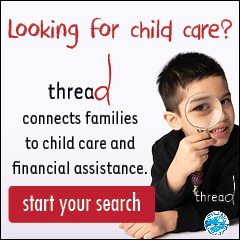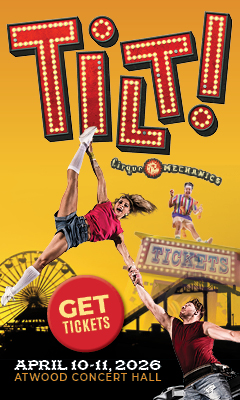
Picking a Preschool?
Select the one that's right for your child
Story by Aniela Wills
Is preschool right for my child? What should I look for in a preschool? What will my child need to prepare for Kindergarten?
So many questions! First, let’s narrow down your focus some. As one early education expert points out, the most important question is: What’s best for my child?
Mother of two, Lisa Lampl, sends her 4 1/2-year-old son Josh to preschool on Fort Richardson. He’s been going there since August while she works as a physical trainer. In that time, he’s learned to write his name and follow the direction of his teacher, skills he was not willing to learn at home. “He just doesn’t listen to me and he doesn’t want to learn from me,” explains Lampl. “His focus is elsewhere but when he’s with a group, he’ll follow along.”
Following along is exactly what Anne Marie Niglio does not want for her soon to be 4-year-old daughter Katherine. “The reason I veer away from public schools or any kind of schools really is the loss of innocence and the influence of other children,” says Niglio. The art therapist turned stay-at-home mother of two is expecting her third child this summer. She says she can teach her daughter anything she could learn in preschool, saying Katherine “already knows her alphabet and her numbers, thanks to Leap Frog!”
However, Julia Jackson, director of Family Services at Thread Alaska, says what’s really crucial in gearing up for Kindergarten isn’t learning numbers or ABCs, but what kids can’t get at home: “Preschool provides a time and place for experimenting and learning and how to interact in a group environment.” She says children do that best when their parents aren’t there to intervene.
Now for the choices
To preschool, or not to preschool? It doesn’t have to be a black and white issue. Jackson says there are shades of gray. There are many kinds of preschools to choose from: large centers, in-home preschools and even family-run preschool co-ops. Jackson says parents should do their homework and ask themselves: “How much stimuli is my child ready for?” And, it doesn’t have to be all or nothing. Parents can choose from full- or part-time programs.
What’s your child like? While Jackson says every child can benefit from preschool, picking which kind is truly up to the personality of your potential preschooler. “A shy, withdrawn child needs a more structured, secure, very small group. We don’t want to throw that type of child into a loud, noisy center.” She says an in-home setting might be a better pick for a shy child. An active child, on the other hand, could thrive in a center with more activities like field trips or guest speakers.
There’s another option for parents like Niglio, who aren’t interested in sending their child off to a center with lots of other children. In parent run co-op programs, parents take turns running a preschool activity. Jackson says the focus should be on fun and interacting in a group. Niglio says her daughter Katherine regularly spends time in small group activities with other kids, but the time spent teaching her daughter offers a bond she may not get otherwise.
The center Lampl’s son Josh attends seems perfect for what he needs: structure and socialization. She says Josh is a “very social creature and wants to play and be creative.” During his time at the center, Josh works on activities, plays with other children and naps. Lampl says she was worried about Kindergarten, since Josh didn’t like to write, color or draw. Now, she feels “very optimistic” because he’s working on those skills every day.
Scout it out
Now that you’ve narrowed down what kind of preschool, if any, to attend, get to work by scouting out the facility you’re considering.
Here’s what to look for:
Who’s the boss? Julia Jackson of Thread tells parents to pay attention to the style of the person running the program and try to determine if their child would mesh well. “Are they firm and directive? Easy going and fun? You know your child and whether they would be turned off or interested and engaged,” she says. That personality “is super important to motivating your child for future programs and environments they are going to be in.”
Variety. The curriculum should focus on outdoor and indoor play, as well as developmentally appropriate activities.
Small group ratio. Does the preschool have a staff large enough to give your child the attention and care he needs? The National Association for the Education of Young Children (NAEYC) recommends that a preschool should have one teacher for every seven children, with no more than 14 children (and two teachers) per group. Ask what the teacher-child ratio is and decide whether that's adequate for you. No matter how many teachers they may have, a good preschool will keep groups of children small to encourage interaction and development.
One-on-one attention. Good preschool teachers know when to respond to individual needs. As you're visiting a preschool, assess how the preschool handles redirection, conflict resolution and opportunities to teach kids how to choose the right behavior, notes Jackson. Observe teachers closely during those times when things aren't going exactly as planned. You'll learn a lot.
A place to relax. Just like adults, kids need downtime too. “They’re preschoolers. They should have time to be babies and just need some time to relax,” says Jackson. She says look around the classroom for a safe, comfortable, quiet place like a book nook where kids can debrief and refocus. “If they don’t have that they might get over stimulated, start to reject the experience and not want to attend anymore.”
Still looking for answers or need help on where to go from here? Jackson says Thread Alaska can help. Parents can talk about what specific needs their family and child has and Thread can “generate a search that meets those needs, answer any questions about different options, standards and quality care.”
When in doubt, think about your little one – that’s key, says Jackson. “Avoid looking at the program through any lens that doesn’t include the child’s perspective. If the child doesn’t like it, then it’s not the right program.”










